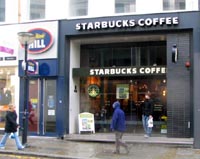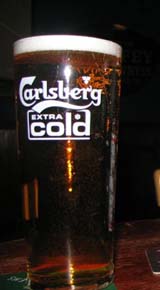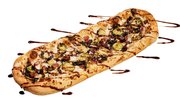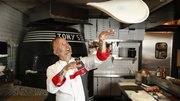Article
The state of the London coffeehouse
Traditional cafés stave off Starbucks. In fact, Starbucks may have actually helped the once-dying London coffeehouse.

April 16, 2006
Just a few years ago, Britons were drinking instant coffee, and cafes were on the decline. Pubs were the places to gather in the U.K., and pints took precedence over cappuccino.
But a recent study by researchers at the University of Glasgow showed that the gourmet coffee culture has rebounded to mimic a time beginning in the mid-17th century when cafes were social centers throughout Great Britain: places for women to bring their newborns to show off to friends, places to exchange ideas and meeting spots for trade.
Eric Laurier and Chris Philo spent three years studying the emerging café culture, from videotaping behavior patterns of consumers to actually working in coffee shops in London. They observed a variation between cafés in which business was based on regulars and those that depended largely on walk-in customers.
"If you think about the former," Laurier said, "that's the sort of place 'where everyone knows your name' and where their customers are particularly loyal. They recommend their cafe to their friends and acquaintances, they are concerned about its business and they know quite a bit about its staff and vice versa."
Laurier feels strongly that, while the popularity of cafés has ebbed and flowed over the years, the current trend promises some staying power.
 |
Although Starbucks has penetrated the London market, the traditional coffeehouse is strong as ever. (Kevin Gibson) |
London, for instance, had the highest density of coffeehouses in Europe in the 18th century, yet the London coffeehouse had virtually disappeared 100 years later, Laurier said. Similarly, at the beginning of the 20th century Glasgow featured tea rooms and coffeehouses that contained cinemas, hosted a telephone bank — "The Internet of the day," Laurier said – occupied as many as four floors and were built by the leading architects of the day.
"Fifty years later, they were gone," he said. "In swinging-'60s London, there was a brief explosion of cappuccino-serving cafes and 20 years later they were gone."
Starbucks invasion
Starbucks led the charge for gourmet coffee in the United States and has infiltrated the U.K. as well. Interestingly, however, the notion that the coffee chain spells doom for the local coffee shop may be inaccurate. Starbucks entered the U.K. in 1998 when it purchased 65 stores from Seattle Coffee Company, and BeverageDaily.com reported that there are now more Starbucks stores in London than in Manhattan. But rather than strangle the competition, Starbucks may have actually helped drive an overall trend.
Matt Carter manages a Liverpool Costa Coffee — an Italian chain which has more than 300 stores in the U.K. — and has worked for the company for five years. He said more and more coffee shops, chain and independent, are opening in Liverpool, especially in and around the Lime Street Station in the City Centre. He attributes this in part to the number of business people who meet in the stations. At the same time, he said, he sees regulars meeting in his shop on nearly a daily basis, reading the news, meeting friends or people-watching. Using Wi-Fi connections to catch up on e-mail is another popular activity in Liverpool coffeehouses.
"It's kind of a social thing," he said.
And while traditional pubs, long the social gathering places of choice, are still strong in the U.K., modern hybrid pubs that spring up are serving alcohol along with gourmet coffee. The Welkin in Liverpool is one such pub, offering a huge selection of craft beers, a full bar, a fast-casual style of foodservice and gourmet coffee.
"The newer pubs can be hard to distinguish from cafes except in terms of their licensing and opening hours," Laurier said. "They are taking on something of a Jekyll and Hyde character, by day serving lattes and croissants to shoppers weighed down with carrier bags and by night cocktails to clubbers with tiny handbags."
Carter also noted that the pubs actually help his store. Because pubs in Liverpool can open and serve alcohol at 10 a.m. and continue serving until 6 a.m. the next day, coffeehouses there benefit as pub-goers crave the coffee the day after to help stave off hangovers.
 |
The traditional pub has struggled as the coffeehouse grows stronger. (Kevin Gibson) |
Asked if he thinks coffee shops are replacing the pubs, Carter said, "I think they are, actually. I see a lot of people here who drink in the pubs all evening then come in here the next day." He suggested that a migration toward coffeehouses as a primary social outlet might be in its beginning stages.
But Laurier points to smoking bans in Ireland and Scotland and the trend toward such bans in the U.K., as well as changing ownership patterns within the U.K. pub community, as greater threats to the pubs than Starbucks.
"In the café sector it is the cheap, greasy spoons and Italian cafes that have been pushed out of business by the arrival of the chains," he said. "Starbucks has become an easy target for critics of globalization, and while I wouldn't want to praise their proliferation across all of our streets, they have raised the standards of espresso-based coffees and raised customer expectations across the U.K. of the quality of coffee they drink."
Laurier expects the coffee culture to stay strong over the next few years, going against what history has taught the world about the coffee culture in the U.K. He said the scale of coffee house development in the Anglo-Saxon world has drinking habits in such a wholesale manner that it is difficult to imagine the tide ebbing much over the next few decades.
Nevertheless, there has been such dramatic change over the last decade "that it's hard to imagine we will see the high rate of change continue," he said.
Over the next five years, "there'll be a bedding-in period as we start to take it for granted that we can have a cappuccino and muffin for breakfast anywhere in the UK and USA. As barista skills become more widely disseminated I hope we will see a return of the independents challenging Starbucks and the other big chains."
Bakery CafeRestaurant Design / LayoutInternational FranchisingCoffee / Specialty BeveragesTrends / StatisticsMarketingOperationsFood & Beverage
Related Media
Food & BeveragePresented ByOracle
Presented ByOracle
 ChatGPT
ChatGPT Grok
Grok Perplexity
Perplexity Claude
Claude












